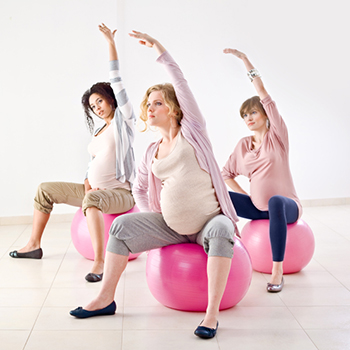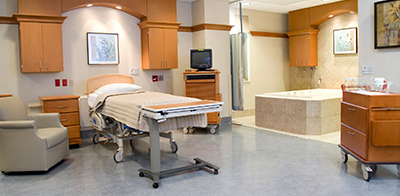
An overall review of your health and lifestyle before you become pregnant will contribute to the good pregnancy outcome that every woman wants. Visits to your OB care provider before you conceive will allow you to review any medical concerns and medications you may be taking. You and your provider will also discuss lifestyle changes, such as stopping smoking and avoiding alcohol, that are important to help avoid pregnancy complications and birth defects. Taking a vitamin that contains folic acid before you become pregnant and during the first weeks of pregnancy is another important way to minimize the risk of certain birth defects. Achieving a normal body weight before you become pregnant also decreases risks of pregnancy complications, such as gestational diabetes and pregnancy-induced hypertension.
Comprehensive prenatal care
Congratulations on your pregnancy! Your OB care provider’s goal is to help you have a healthy and safe pregnancy. Prenatal care is very important for you and your developing fetus. Starting early in your pregnancy, you will be given information to assure that you are following a healthy pregnancy lifestyle. You will have routine testing for problems that can affect your unborn child. You also will be offered tests that can alert you and your provider to the possibility of genetic problems or birth defects. While no testing can guarantee a normal pregnancy, your OB provider can guide you to select the testing that best meets your needs.
As your pregnancy progresses, visits with your OB provider will become more frequent. These visits will allow your provider to watch for signs of health problems that become more common toward the end of pregnancy. You will learn about the changes to expect as you experience the final weeks of your pregnancy, signs of labor, and when to call your provider.
Remember, pregnancy is normal, and most pregnancies end happily with a healthy mom and healthy baby. Prenatal care and the guidance of your OB care provider can help you make that goal a reality.

Labor and delivery
Signs of labor are contractions that increase in frequency and intensity, usually over several hours, and/or rupture of membranes (your “water breaks”). Some women will have “bloody show,” which is a small amount of bloody mucus that occurs as their cervix thins and dilates. The early part of labor, called latent labor, can last many hours. The uncomfortable contractions of latent labor lead to the early opening (dilation) and thinning (effacement) of the cervix. Usually, when the transition to active labor occurs, contractions will become much more painful and usually very consistent. Women in labor will be offered pain medication, either through an IV line or by epidural, as time and circumstances allow. Women who have already had one or more deliveries will usually have more rapid labors than first time moms, but that certainly can vary from person to person.
Cesarean section is a possible outcome of any labor – whether it’s a woman’s first pregnancy or her fifth. C-sections are performed as necessary for the health of the baby or the mother. Most women have ideas about how they think or wish their labors and deliveries will proceed. Some women are disappointed when their labor ends in a c-section delivery. However, a C-section is a necessary part of a good outcome for some moms and babies. Remember, the goal of a successful pregnancy is a safe delivery.
We encourage women to consider taking a childbirth class. These classes provide information on the labor process, coping methods for the pains of labor and delivery, and a variety of other topics intended to help women and their partners be prepared for the new and sometimes intimidating experience of labor, delivery, and early parenting. Knowing what to expect during childbirth gives many women a sense of control and security that makes their experience more satisfactory. There are a variety of methods of childbirth preparation, such as Lamaze or Bradley. A little research will help you choose the class that is best for you. Click for the Childbirth Education Schedule at St. John Medical Center.
Holistic birthing options
 Click here for a video of the Holistic Birthing Center at
Click here for a video of the Holistic Birthing Center at
St. John Medical Center
The holistic birthing experience embraces the natural experience of labor and delivery, focusing on minimal medical intervention. The holistic birthing experience in a hospital setting combines the natural birthing experience with the safety of the hospital environment. Women with low-risk pregnancies may make many decisions about their labor course, including use of pain medications, activity and diet during labor, avoidance of labor induction, and the presence of desired support persons during labor. In a low-risk pregnancy, fetal monitoring can be performed in a manner that allows a woman to move about in ways that bring her comfort during labor. When labor progresses normally and fetal well-being is assured, little else is required except support and observation. The holistic birthing experience is a satisfying option for many women.
Nutrition and exercise during pregnancy
You are what you eat. When you are pregnant, your developing baby is also what you eat! A healthy diet is important in all stages of pregnancy. Eat foods rich in proteins, vitamins and minerals (such as calcium and iron), and low in simple sugars (such as pop, candy and many deserts). Such a diet will provide the nutrition that the growing fetus needs, and also helps to keep your pregnancy weight gain at a healthy level.
Fish is a good source of lean protein and essential fats. However, most fish and shellfish contain small amounts of mercury. Pregnant women should avoid shark, tilefish, swordfish and king mackerel, and should limit other fish, including canned tuna, to six to 12 ounces per week. Processed meats such as hot dogs, and even lunchmeats, should be heated thoroughly before eating to kill any bacteria that may have contaminated the meat processing. Do not eat unpasteurized milks and cheeses, as they may carry bacteria that can cause serious pregnancy complications.
Do not drink alcohol during your pregnancy. Alcohol can cause birth defects and learning disabilities. No one knows how much alcohol it takes to cause these effects in the fetus, so the safest approach is to avoid alcohol completely.
Caffeine equivalent to two or three eight-ounce cups of coffee a day appears to be safe during pregnancy. Artificial sweeteners, used in moderation, also are considered safe.

Surprisingly, pregnancy only requires about an extra 300 calories a day. Expected weight gain is 25 to 35 pounds for normal weight women, about 15 to 25 pounds for overweight women, and 25 to 40 pounds for underweight women. Pregnancy is never a time to lose weight for any woman. Women who gain much more or much less than recommended amounts are more likely to have a variety of pregnancy complications.
A vitamin supplement is often prescribed during pregnancy. The prenatal vitamin should be considered an addition to an otherwise healthy diet. Vitamins and minerals are absorbed most efficiently through food sources, so do your best to follow a well-balanced and nutritious diet during your pregnancy, and keep it up after your pregnancy! Do not take more than the recommended amounts of vitamins or minerals during your pregnancy, as some in large amounts can be toxic. Also, some herbal supplements can cause pregnancy complications, so check with your OB provider before using.
Exercise will help your body stay fit and healthy during pregnancy, and will help to make your recovery easier. If you already exercise, you may continue to do so while pregnant. If you do not currently exercise, then adding activity such as walking, swimming or biking to your daily schedule is advisable. However, some exercises should be avoided. Any activity that has a risk of falling or collision, or requires much balance, can result in injury to a pregnant woman. This includes sports such as skiing, skating, horseback riding, and many team sports. Scuba diving is also not advisable during pregnancy due to the risk of decompression sickness in the fetus. Exercise should be avoided in some pregnancy conditions or complications. Check with your OB provider if you have questions about what exercise is right for you.